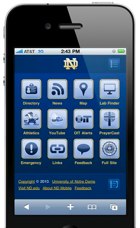Horizon Report 2011 for Marketers
Last year, we looked at the 2010 Horizon Report and the emerging technologies that are expected to affect our institutions in the next five years. Now, the 2011 Horizon Report is out, and as it is with every year some technologies creep closer and others mysteriously fade away. Let’s take a look.
It’s already here
Mobile
As with last year, mobile is the hot technology. Thanks to the work of folks like Dave Olsen and Erik Runyon, I’m confident that higher ed will continue to embrace and develop their mobile solutions. In the meantime, the bar is still fairly low: you need to have a mobile version of your main website, and you should have mobile-friendly styles for the rest of your sites. Check out the higher ed mobile directory for examples.
Electronic books
The other one year prediction is electronic books. Replacing “open content” from last year’s report, this will affect the marketing crowd in how we present traditional print publications. Tablets and e-book readers offer a different experience from the web, and can be used to take magazines and annual reports to the next level. It’s not about porting what you have, it’s about tailoring experience to the appropriate context, device, and user’s needs. Jakob Nielsen’s iPad Usability report is an excellent introduction.
Coming soon
These are identified as two to three years away, though I suspect they are closer than we expect. I also suspect they are less likely to affect marketers than mobile or e-books.
Augmented reality
Augmented reality is still on this list, though the fervor seems to have died down. So far, it seems like marketers have run out of ideas for how to implement this (beyond guided tours and nearest restaurants). There are developing applications for teaching and learning, however, which certainly warrant its inclusion on the report.
Game-Based Learning
Game-Based Learning is also an academic technology, one that is growing explosively and getting plenty of attention. Notre Dame has a number of game-based learning projects, and new stories seem to appear every few weeks. Based on the media attention, I wonder if this is closer than the New Media Consortium realizes.
Further down the road
The last category includes those technologies that are four to five years away: Gesture-based computing and Learning Analytics. I’m excited about each of these, as they signal new developments that may have broad implications for society in general.
Gesture-based computing
From a purely technological standpoint, I consider gesture-based computing to be a “game-changer” in that it is a solution in need of a problem. In other words, we won’t know we needed it until we have it. Motion-sensitive interfaces (a la XBOX Kinect) may start with gaming or in the lab, but will soon find their way into more practical applications.
By providing innovative and powerful interfaces, many researchers and developers will find creative implementations that we will one day find second-nature. If you consider the interfaces you have today (pinch/zoom on your touch smart phone?) you’ll soon realize how strange these are compared to the interfaces of just a few years earlier. It won’t be long before our designers will be racing to take advantage of entirely new interfaces.
Learning analytics
Learning analytics, on the other hand, may have a greater social impact on education and our expectations for how teaching and learning take place. This involves measuring students’ progress and adjusting the curriculum in real-time. For educators at all levels, such tools may relieve the pressure to focus on standardized testing and place more accountability on educators to achieve more substantial outcomes.
Keeps you on your toes
It’s not about porting what you have, it’s about tailoring experience to the appropriate context, device, and user’s needs.
My favorite thing about the Horizon Report is that it forces me to step back and think about how emerging technologies and trends will affect my work. Will I have to adapt to the changes? Is there an opportunity to be a leader? Or are there first-movers to watch and emulate?
The key theme in this year’s report was the idea of user experience. Devices, contexts, and expectations all change the way we deliver content and provide the user experience. Are you still thinking about how to get it done, or are you thinking about how to provide the best user experience?

